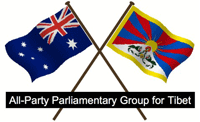Friday 3rd July 2009

We, the representatives of the Australian All-Party Parliamentary Group for Tibet, offer our sincere thanks to His Holiness the Fourteenth Dalai Lama, Prime Minister Samdhong Rinpoche, Speaker Mr. Penpa Tsering, Deputy Speaker Mrs. Gyari Dolma, the Kashag (Tibetan Cabinet) and the Tibetan Parliament for this opportunity to visit Dharamsala and learn first hand about the challenges facing the Tibetan people today.
We further thank the people of McLeod Ganj for their warm hospitality, and the many Tibetan non-government organizations with whom we have met for providing us with a rich insight into Tibetan culture and the situation of Tibetan refugees in India.
May we first acknowledge the extraordinary successes of the Tibetan people here in Dharamsala and in many settlements throughout India and overseas in building a vibrant and flourishing community in exile. We congratulate you on the time and effort you have invested in education, health services, community building and the preservation of your unique culture, heritage and religion.
Our delegation reflects all major parties of the Australian Parliament and is testimony to the depth and breadth of support in Australia for a peaceful resolution of the Tibetan situation. We speak also on behalf of many Parliamentary colleagues and friends in the Australian community who are unable to join us in person.
Australia is home to over six hundred Tibetans. This growing community has become a cherished part of our multi-cultural landscape and we are very grateful for the contribution that Tibetan people and their culture have made to Australian society.
We support, strongly, His Holiness the Dalai Lama’s Middle Way proposal for a peacefully negotiated settlement of the Tibetan situation and regret that the Tibet-China dialogue has so far failed to bring genuine progress towards a mutually acceptable resolution.
In this, the fiftieth year since the Tibetan Uprising of 1959 and the Dalai Lama’s exile, we express our deepest concern and sympathy over the enduring situation inside Tibet, in particular the deteriorating conditions of the last year. Religious repression, “patriotic education” and undemocratic social-economic reforms, including the forced settlement of nomads, have fanned the flames of unrest in Tibet and brought untold suffering to the Tibetan people.
We express our disappointment at the Chinese Government’s outright rejection last November of the “Memorandum on Genuine Autonomy for the Tibetan People” – a detailed proposal for meeting the needs of the Tibetan people within existing provisions in the Constitution of the People’s Republic of China. We support the memorandum as a basis for constructive negotiations on Tibet’s future and will continue to encourage the Chinese Government to enter into sincere and substantive discussions with the Dalai Lama or his representatives over the eleven “subjects of governance” outlined in this important document.
It has been an honour to meet with His Holiness the Dalai Lama, Professor Samdhong Rinpoche and several members of the Central Tibetan Administration here in the heart of the Tibetan exile community. We commend His Holiness, with whom we had the privilege of conversing at some length, for his pragmatic and conciliatory approach to the Tibetan situation and for his calm determination.
We look forward to welcoming His Holiness back to Australia in December of this year, a visit that will coincide with the twentieth anniversary of his Nobel Peace Prize. The visit, which has been given the theme “Our Future: Who Is Responsible?”, comes at a time when Australia and the world at large are facing some of their greatest challenges and opportunities. We look forward to hearing more of His Holiness’s thoughts on universal responsibility, peace, justice and the global environment.
We have been very well looked after here in Dharamsala and are enjoying our visit to India immensely. We will be returning to Australia with a greatly enriched understanding of the Tibetan situation and with many new ideas for providing constructive support from Australia.
Once again, we offer our thanks and appreciation for this unique opportunity and will be doing our best to help secure a better future for Tibet.
Tashi Delek.
Mr. Michael Danby MP, The Hon. Peter Slipper MP, Senator Nick Xenophon, Ms. Melissa Parke MP, Senator Scott Ludlam, Senator Sarah Hanson-Young
